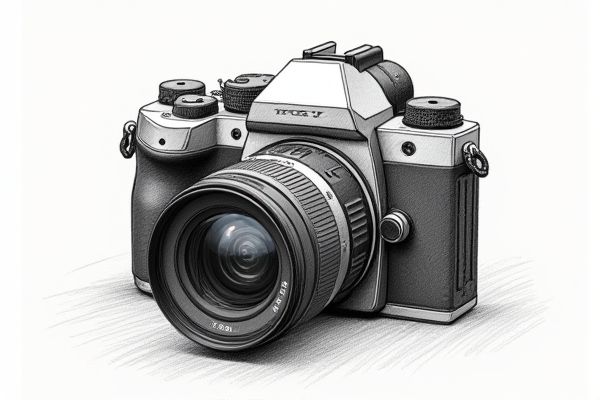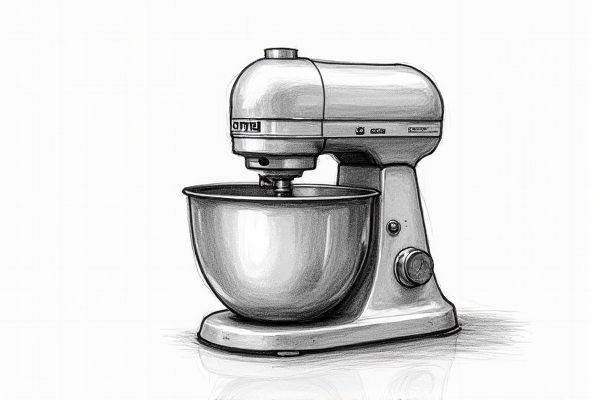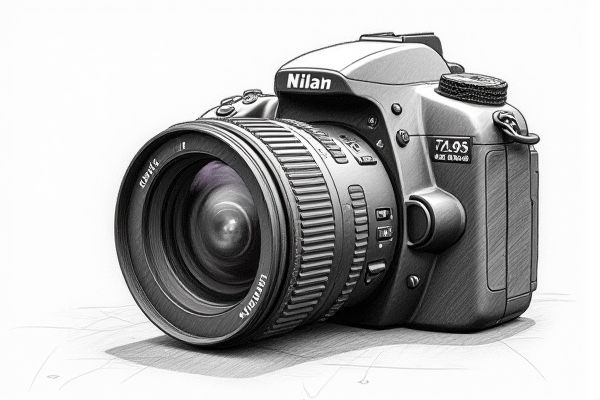In the ever-evolving world of photography, mirrorless cameras have carved out a significant niche, offering portability without sacrificing performance. Renowned for their compact designs and cutting-edge technology, these cameras provide ease of use alongside stunning image quality, making them a top choice for both amateur and professional photographers alike. Leading brands continue to innovate, setting new standards with exceptional features and lenses that cater to a variety of shooting styles and preferences. To explore some of the top brands dominating the mirrorless camera market and find the best fit for your needs, read on below.

Illustration of mirrorless camera
Best brands of mirrorless camera in 2025
Sony
Sony is a leading producer of mirrorless cameras, having claimed the number one market share in the full-frame interchangeable lens market for 2023, based on internal data. The company holds a significant 49.7% market share in Japan's mirrorless camera sales, as per BCN rankings, with Canon and Nikon following at 20.2% and 12.6%, respectively. Sony's image sensor business also dominates, with a 53% global market share by revenue in 2023, up from 49% in 2022. The company has invested heavily in CMOS image sensor technology, with 1.5 trillion yen ($10.6 billion) spent over the past six years. Sony's cameras, such as the Sony a7RV, continue to innovate with advanced features like improved autofocus and global shutter technology.
Canon
Canon remains the leading brand in the mirrorless camera market, capturing a significant 46.5% market share in 2023 and maintaining this dominance in 2024, according to reports from Nikkei and Statista. Despite other brands like Sony and Nikon introducing innovative models, Canon's strategy of launching affordable options, such as the EOS R8 and EOS R100, has helped it retain its market lead. In 2023, Canon's market share was notably higher than Sony's 27.9% and Nikon's 11.3%. This strong market presence is attributed to Canon's broad range of products and its loyal customer base. The company's market share is almost 20% higher than the next closest competitor, Sony. For more insights into Canon's popularity, you can read this new report.
Nikon
Nikon has solidified its position as a leading producer of mirrorless cameras, particularly in the Japanese market, where it has gained significant market share. As of May 2023, Nikon's mirrorless market share rose to 12.9%, placing it in the third position, driven by the success of cameras like the Nikon Z8 and Z9. The company's Z-series, introduced in 2018, has been well-received for its full-frame FX sensors, in-body image stabilization, and compatibility with Z-mount lenses. Nikon's market share improvements are evident from its rise in the BCN retail rankings, which aggregate sales data from approximately 40% of Japanese retailers. This growth underscores Nikon's commitment to innovation and customer satisfaction in the mirrorless camera segment. For more information, visit Nikon's corporate profile.
Fujifilm
Fujifilm is a notable player in the mirrorless camera market, having sold 430,000 units in 2023, which accounts for a 6% market share. Despite production and shipping challenges, Fujifilm's X and GFX series cameras remain popular, with the X-T5 and GFX100 II contributing significantly to revenue growth. The company's market share in mirrorless cameras is around 8%, according to specific market analyses. Fujifilm's products, such as the X-M5, are designed to appeal to both emerging and seasoned content creators with their advanced features and intuitive controls. The brand's strong position is also reflected in its revenue targets, aiming for record-high sales by the end of 2025.
Panasonic
Panasonic, though a smaller player in the camera market, is renowned for its high-quality mirrorless cameras, holding a 5.5% share in the global mirrorless camera market as of 2024. Despite its relatively small market share, Panasonic has introduced premium cameras like the DC-S1H and the Lumix S9, which cater to social media content creators and offer advanced features. In 2021, Panasonic accounted for 4.4% of the global digital camera market, with Canon and Sony leading the market with significant shares. Panasonic's collaboration with Leica on lenses, such as the Nocticron 42.5 f/1.2, has also been praised for its exceptional bokeh quality and overall performance. The company continues to innovate, contributing to the growing demand for high-performance mirrorless cameras. For more detailed Panasonic camera statistics, you can visit their comprehensive overview.
Olympus
Olympus is a renowned producer of mirrorless cameras, known for its high-performance models such as the E-M1, which offers exceptional image quality, fast autofocus, and advanced 5-axis image stabilization. In 2015, Olympus held a significant market share in the mirrorless segment, shipping around 550,000 units, although this number was expected to decline to 460,000 in the following year. Despite the decline, Olympus remains a key player, especially with its Micro 4/3 system, which is praised for its excellent lenses and overall system performance. In recent years, OM Digital Solutions, the successor to Olympus's camera division, has seen a slight increase in market share, up by 1.6% in 2023. Olympus's cameras are favored by professionals and enthusiasts alike for their robust build, speed, and image quality.
Leica
Leica, renowned for its high-quality and timeless camera designs, stands out as a premium producer in the mirrorless camera market. Despite being a smaller company, Leica's products, such as the Leica SL, are highly regarded for their exceptional image quality, intuitive controls, and the ability to use manual focus lenses with precision. In the global mirrorless camera market, Leica, although not among the top market share holders, is valued for its unique and reliable offerings, often preferred by photographers seeking superior image quality and a distinct user experience. The Leica SL, for instance, is praised for its 4.4MP EyeRes viewfinder and compatibility with Leica M lenses, making it a favorite among professional photographers. Leica's commitment to quality and design ensures its products remain highly sought after, even if they come at a higher cost.
Sigma
Sigma is a renowned brand in the photography industry, particularly noted for its innovative and high-quality mirrorless cameras. The Sigma FP, for instance, is the world's smallest and lightest full-frame camera, boasting a 24MP full-frame CMOS sensor, 12-bit Cinema DNG capabilities, and an electronic image stabilization system. This camera stands out with its robust and lightweight aluminum body, dust and splash proof structure, and support for UHD 4K video at 24, 25, and 30 fps. Despite not being among the top market share holders in the mirrorless camera market, Sigma's unique offerings and technological advancements make it a significant player. The mirrorless camera market, expected to reach USD 4.73 billion in 2024, sees Sigma as a unique contender with its distinctive products.
Hasselblad
Hasselblad is a renowned Swedish manufacturer of high-end medium-format cameras, particularly notable for its mirrorless offerings. The brand has a rich history, including the use of its cameras in the Apollo program missions. In 2016, Hasselblad introduced the world's first digital compact mirrorless medium-format camera, the X1D-50c, marking a significant shift in portability for medium-format photography. The X2D 100C, released in 2022, features a 100-megapixel BSI medium-format sensor and a five-axis in-camera image stabilization system, solidifying Hasselblad's position in the market. Despite producing only about 10,000 cameras annually, Hasselblad's products are highly valued for their technical expertise and design quality.
Pentax
Pentax, although not a leading player in the mirrorless camera market, is known for its loyal customer base and unique offerings. However, the brand has been more focused on DSLRs, as evident from their recent release of the K-3 Mark III, indicating a strategy that diverges from the industry's shift towards mirrorless cameras. Despite this, Pentax holds a niche market share, and their products are appreciated for their ergonomic design and specific features. The global mirrorless camera market, dominated by brands like Sony, Nikon, and Fujifilm, sees Pentax as a smaller but significant player, particularly among professional photographers and enthusiasts. For insight into Pentax's strategy emphasizing DSLRs, consider reading why Pentax is convinced DSLRs are the future.
















Leave a Reply
Your email address will not be published.